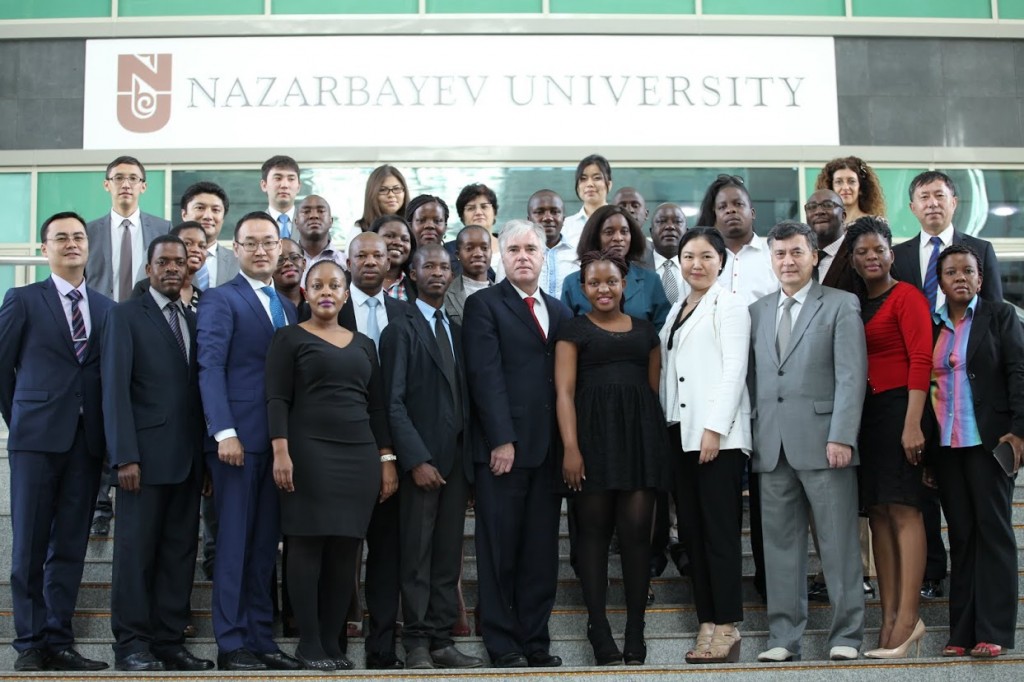ASTANA – A fortnight-long international seminar on public health for specialists from Africa began July 20 at Nazarbayev University (NU), reported the university’s press service.

Participants and organisers of the medical seminar pose in front of Nazarbayev University. Photo: National Laboratory Astana, Nazarbayev University.
Scholars from the Centre for Life Sciences (CLS) National Laboratory Astana at NU will hold courses for 24 professionals from eight countries on issues of epidemiology, biomedicine and public health. Kazakh Deputy Foreign Minister Yerzhan Ashikbayev greeted the participants on the opening day, wishing them successful training and highlighting his nation’s commitment to assist with the development goals of African countries. The specialists are from Botswana, Eritrea, Ethiopia, Kenya, Malawi, Swaziland, Tanzania and Zimbabwe.
The CLS scientists will use the seminar to provide an intensive training programme and exchange expertise in the three fields in accordance with modern requirements of global healthcare.
“This is a joint project of the Ministry of Foreign Affairs of Kazakhstan and the UN Development Programme (UNDP) in Kazakhstan. It was decided to organise several seminars and to dedicate one of them to medicine. […] We will share the experience of Kazakh scientists. The programme will have several parts: the first one is methodological; the second part is visiting different laboratories and the last part is to learn about the work of hospitals in the city,” said Adil Supiyev, head of the CLS laboratory of epidemiology and public health.
He added his hope was workshop participants would gain knowledge and skills that will be applicable in their countries. In particular, the training concentrates on methods of scientific research in the field of epidemiology and biomedicine. Supiyev noted it is also useful for the centre’s scientists to learn more about experiences in the participating countries, as most of them work in the public healthcare system.
Munkhtuya Altangerel, UNDP Deputy Resident Representative in Kazakhstan, noted the UNDP is present in all countries of the African continent.
“The UNDP is now working on the objectives of sustainable development in which we particularly stress the importance of South-South Cooperation, partnerships and knowledge-sharing within the framework of such cooperation. UNDP believes that the engine of development in the future will be this type of partnership, which includes the exchange of experience between different countries, both developed and developing,” she said.
Seminar attendant Michael Nyamuranga, who works in the Zimbabwe Ministry of Health and Child Care, said one of Africa’s major healthcare concerns is infectious diseases.
“I hope this training will help me learn how to better deal with these problems, especially when working with limited resources,” he added.
The symposium’s main goal is to help participants acquire systematised theoretical knowledge and practical skills in the three medical areas. The programme includes lectures and workshops presented by leading NU researchers.
The curriculum is the inaugural event of the Africana Training Programme, part of the joint project between the Kazakh Ministry of Foreign Affairs and the UNDP aimed at delivering development assistance to countries in Africa, Oceania, and the Caribbean through capacity-building training for young professionals. The project’s goal is to strengthen the scope of select mid-career specialists, university graduates and researchers to allow central and local governments to operate in a more effective, transparent and accountable manner.
During 2015, UNDP and the ministry will also organize a series of professional update courses in Kazakhstan in fields of oil and gas exploration, public health and Kazakh agriculture for specific individuals from a number of African countries. The project envisions two more short-term thematic trainings in agriculture and oil and gas exploration, with field visits for 90 students from 23 African nations.

